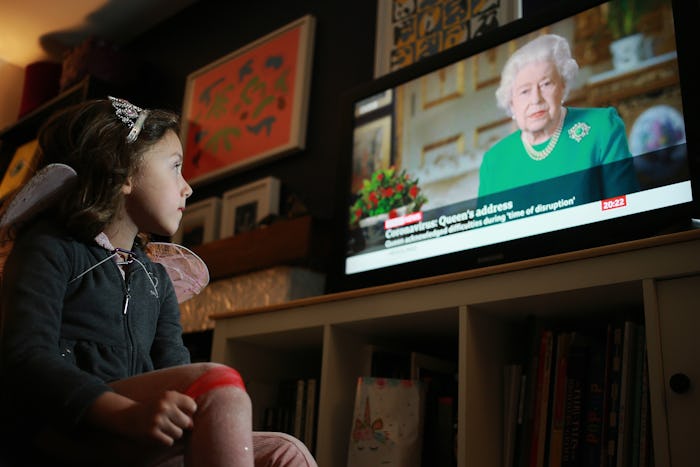News

"We Will Meet Again": Queen Elizabeth Addresses Coronavirus In Rare Televised Message
In a rare televised address, Queen Elizabeth II urged those living in the United Kingdom to "remain united and resolute" in their fight against the ongoing coronavirus pandemic. While acknowledging growing anxiety, grief, and financial difficulties, she urged viewers to continue to display "self-discipline," fellowship, and the "quiet good-humored resolve" that characterized how previous generations weathered hardships. Ultimately, the Queen's coronavirus address sought to comfort and reassure listeners that they would eventually see "a return to more normal times."
"I am speaking to you at what I know is an increasingly challenging time," Queen Elizabeth said Sunday in a video address recorded from Windsor Castle, where she and husband Prince Philip have been self-isolating. "A time of disruption in the life of our country: a disruption that has brought grief to some, financial difficulties to many, and enormous changes to the daily lives of us all."
The 93-year-old monarch then moved to thank National Health Service workers as well as those serving in other essential roles, noting that "what you do is appreciated and every hour of your hard work brings us closer to a return to more normal times." She also thanked those who were doing their part to help flatten the curve and protect the nation's more vulnerable populations by staying at home.
"Together we are tackling this disease, and I want to reassure you that if we remain united and resolute, then we will overcome it," she said.
According to John Hopkins University, there have been more than 48,450 confirmed cases of the novel coronavirus in the United Kingdom and more than 4,940 deaths.
Speaking Sunday, the Queen drew comparisons between the social distancing being practiced across the United Kingdom to the separations that happened as a result of World War II evacuations. "It reminds me of the very first broadcast I made, in 1940, helped by my sister," Queen Elizabeth said, referencing a broadcast she'd given at age 14 to British children evacuated from their homes for safety reasons. "Today, once again, many will feel a painful sense of separation from their loved ones. But now, as then, we know, deep down, that it is the right thing to do."
She also noted that how residents respond to the ongoing coronavirus pandemic will later serve to define the nation. "Those who come after us will say that the Britons of this generation were as strong as any," Queen Elizabeth said. "That the attributes of self-discipline, of quiet good-humored resolve and of fellow-feeling still characterize this country."
She added that Britain's nightly applause for hospital, care, and essential workers would ultimately be "remembered as an expression of our national spirit" while the rainbows drawn by children and placed in windows in an effort to spread hope would serve as the its symbol. What's more, she reassured Britons that they were not alone in their fight against the novel coronavirus. "We join with all nations across the globe in a common endeavor, using the great advances of science and our instinctive compassion to heal."
Although the Queen regularly addresses the nation in a televised Christmas message, special broadcasts like Sundays are more rare. According to NBC News, this was the first time since her Diamond Jubilee in 2012 — and only the fifth time in all of her 68-year reign — that she has issued such a broadcast.
What's more, her address arguably stands in sharp contrast to remarks U.S. President Donald Trump has made, which have so far been more self aggrandizing and centered around shifting or assigning blame. When Trump addressed Americans from the Oval Office on March 11, for example, he blamed the United States' new COVID-19 cases on Europe and announced travel restrictions that later had to be clarified by other government officials. Trump has since appeared to offer medical advice, including recommendations for COVID-19 patients to take hydroxychloroquine, that The New York Times reported doctors later cautioned against due to a lack of thorough research and testing.
In an effort to slow the spread of coronavirus, the United Kingdom instated a three-week nationwide lockdown on March 23 with all nonessential businesses ordered to close. Government leaders are expected to reassess the need for a lockdown at the end of the three weeks, according to NBC News. Both Prince Charles and British Prime Minister Boris Johnson have tested positive for the novel coronavirus. While Prince Charles is reported to have since recovered, NPR has reported that Johnson remains in self-isolation.
While speaking from Windsor Castle, Queen Elizabeth also noted that although there would likely be more challenges and hardships ahead of UK subject, better days would eventually come. "We will be with our friends again," she said. "We will be with our families again; we will meet again."
If you think you’re showing symptoms of coronavirus, which include fever, shortness of breath, and cough, call your doctor before going to get tested. If you’re anxious about the virus’s spread in your community, visit the CDC for up-to-date information and resources, or seek out mental health support. You can find all of Romper’s parents + coronavirus coverage here, and Bustle’s constantly updated, general “what to know about coronavirus” here.